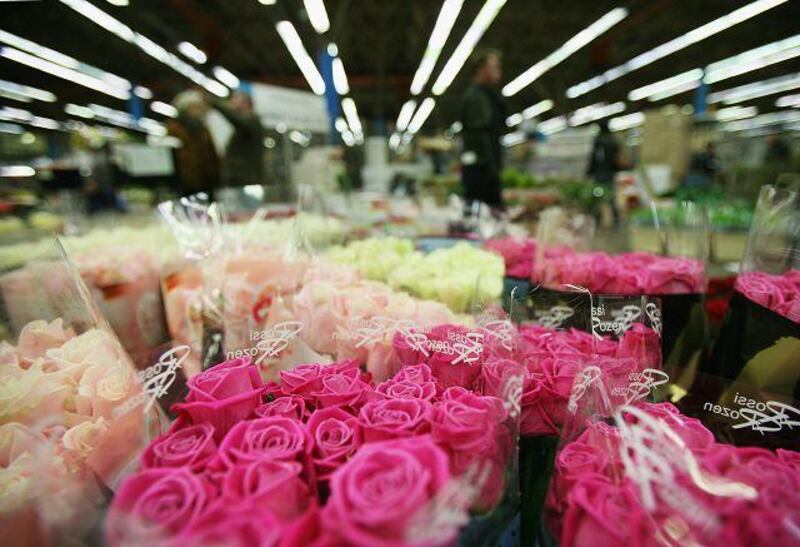Saturday is Valentine's Day, which gives everyone just two more days to buy something for that special someone. A lot of people go in for the traditional box of chocolates, the bunch of red roses, or that fancy dinner in a romantic restaurant where they can stare into each other's eyes over candlelit meals. For the financially (or romantically) challenged, there's always the mass-produced Valentine's card. In this financially challenging environment, though, it's hard to feel too lovey-dovey. One greeting card company in the US has come up with a way to beat economic doom into Valentine's ploughshares by developing cards with Great Depression-themed messages. "I made you a Valentine," reads one of the Order of St Nick's "Depressing Times" cards, "but I had to burn it in a trash can to stay warm". Another shows a man, presumably a banker, telling another: "Box of chocolates? She'll be lucky to get a box of rocks from me this year." A little gallows humour always helps to lighten the mood, although it is unlikely to produce exactly the kind of amorous atmosphere Valentine's sweethearts may be hoping for come Saturday night. Stocks used to be the way to win them over. A few shares of Google or Apple used to go down a treat. Until last July, oil and mining stocks were truly the way to say "I love you". There are plenty of analysts who will tell you that the latest declines in stocks make them a bargain. And by traditional measures there is plenty to warm to. The average price-to-earnings ratio for stocks on Dubai's benchmark index is about 3.6, which would look like a runaway steal if you hadn't picked up a newspaper in the past three months. The problem with using price-to-earnings, or P/E ratios, to value stocks is that it fails to take into account the outlook for earnings, which is what stock prices tend to reflect. These days the outlook seems to be going south everywhere, so it's important not to go cherry-picking for market bargains and end up with a basket full of lemons. Paul Schulte, a strategist at Nomura International in Hong Kong, has suggested looking at stocks based not on their price, but on their relative ability to survive the global credit crisis without going bust. That's a quality that would exist only in the eye of the beholder if it weren't for a gentleman named Edward Altman, who in 1968 developed something called a Z-score to predict the likelihood of a company going bankrupt. Never mind how it works, it's a potent concoction that includes a pinch of working capital, a dab of retained earnings, a dollop of earnings, equity and a dash of sales all on a bed of assets. Companies that have scores over a certain level are considered healthy. Others below that fall into a hazy area of sickness and those below a certain threshold are considered infected. Mr Schulte and his colleagues used the Altman Z-scores to compile a sampling of Asian stocks. Applying the same lens on stocks in Dubai and Abu Dhabi yields a shortlist of healthy offerings. But keep in mind that the Altman Z doesn't apply to financial companies, which dominate indexes here, and many companies in the UAE don't provide enough data to compile a score - a red flag of its own. Topping the list of durable issues is Arkan Building Materials, the Abu Dhabi-based construction company whose stock just happens to have risen about 48 per cent this month. Then comes Abu Dhabi National Hotels, International Fish Farming, and Aramex, the logistics company. The violence in Gaza may give some pause, but next on the list is Palestine Telecom, followed by Sharjah Cement, Gulf Pharmaceutical, the dominant UAE phone company Etisalat, food and beverage company Agthia and Fujairah Cement. Why not take a shopping trip overseas to let the object of your desire dabble in diversification? Economists warn that with governments borrowing big or warming up the printing presses to try to spend their way out of recession that the safest havens for cash are countries with fat current-account surpluses. No, not the US. Or Britain. Avoid Costa Rica and Morocco. Romania and Estonia are straight out. The list of best-insulated economies includes some surprises. If current accounts be the food of financial stability, consider a romantic getaway to Malaysia, which tops the list of current-account surpluses relative to economic size. It is followed by fellow resource exporters Papua New Guinea and Kuwait. Another oil exporter, Venezuela, comes in fourth, and then thrifty Singapore and China. Next come Croatia, Kazakhstan and the tax-haven of Luxembourg. And rounding out the list is Russia - Moscow is just lovely this time of year, snugly cold with a sprinkling of snow. The more conservative suitor may be more comfortable this year, however, giving gold - classic, lustrous and if Morgan Stanley is correct, one of the best hedges against the attempt by global governments to reflate their economies. Gold has long been considered a bulwark against inflation, so it has suffered of late amid fears that the world may face deflation. But an increasing number of economists worry that inflation may be around the corner, particularly in the wake of the Obama administration's roughly US$3.3 trillion (Dh12.12tn) package of fiscal stimulus and financial assistance announced this week. Morgan Stanley's commodities analysts predict that gold, now trading at about $925 per ounce, will rise to roughly $1,000 an ounce next year, and $1,050 in 2011. Truly a Valentine's gift that could keep on giving. warnold@thenational.ae
There's plenty in stock for that Valentine's gift
A lot of people go in for the traditional box of chocolates, the bunch of red roses, or that fancy dinner in a romantic restaurant.

Editor's picks
More from the national




